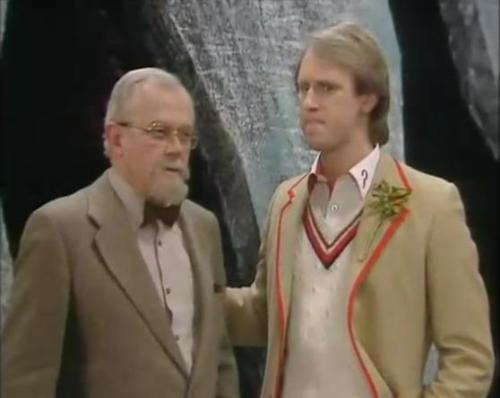 The episode “Time-Flight
The episode “Time-Flight” from the Peter Davison era makes brief mention of the tragic death of Adric at the end of the previous episode, before we see the Doctor back to his old self, and counseling his companions that Adric would not want them to mourn unnecessarily. Although it is understandable that the show’s writers would not want to dwell on the death of Adric, he seems to have been forgotten rather too quickly for plausibility. But given that the show regularly flits between the camp and the tragic, the scary and the philosophical, it is not all that surprising that this next episode had a strong humorous element, as the Doctor struggled to land his TARDIS, successfully managing to do so at Heathrow Airport.
The Doctor then gets involved in a search for a missing concorde. The TARDIS gets loaded on a second concorde and with the Doctor and his companions on board along with the TARDIS, the plane follows the same course as the original, and a time stream takes it back to prehistoric times. But upon arrival, it looks as though they have managed to return to Heathrow – but it is all an elaborate illusion. In that context, the Doctor recites a poem which mentions God:
NYSSA: There’s something very unreal about all of this.
DOCTOR: That’s why this tree doth continue to be since observed by yours faithfully, God.
STAPLEY: What’s that, Doctor?
DOCTOR: To be is to be perceived. A naive eighteenth century philosophy.
You can read the whole of George Berkeley’s poem online by clicking here.
The episode reflects the fascination with concorde in the 1980s. It also revisits the theme of skepticism and technology that seems like magic, in a way that makes a nice pairing with “The Daemons” from the Jon Pertwee era. On the one hand, we have the Doctor’s skepticism that there is real mysticism at work, while on the other hand, we have Professor Hayter’s skepticism of the Doctor’s explanations. In this instance, it turns out that both have a point, as we see in this bit of dialogue, for example:
HAYTER: There’s got to be a perfectly simple orthodox explanation. Bioenergetic powers? Intellectual garbage.
(Hayter examines the globe pedestal.)
DOCTOR: You won’t find what you’re looking for.
HAYTER: Won’t I? You come and look at this. Psychotronics, was it, Doctor? I call it electronics.
(The pedestal contains a circuit board and a lot of wires and pieces.)
DOCTOR: I don’t understand.
 Doctor Who at once seems to encourage the renunciation of belief in magic and embracing of science, and the belief that science can accomplish the magical. And so it is not surprising that its stance on skepticism is ambiguous.
Doctor Who at once seems to encourage the renunciation of belief in magic and embracing of science, and the belief that science can accomplish the magical. And so it is not surprising that its stance on skepticism is ambiguous.
In relation to Berkeley’s view of perception, and the idea that everything continues to exist because it is perceived perpetually by God, it would be interesting to relate this to quantum mechanics. There are those who believe that the very fact of observation (and not just interference as a result of measurement) affects reality, causing the indeterminate to become a concrete reality with specific properties. If this is correct, then it leaves a puzzle regarding the relationship of God to the universe. If there is genuine indeterminacy, then does that mean that there is no God, or that there could be a God but only one that does not observe? Or does it mean that God relates to the natural order in some very different way than human observers do? Or something else?
Doctor Who, as usual, provides some interesting jumping off points for interesting philosophical discussions.












